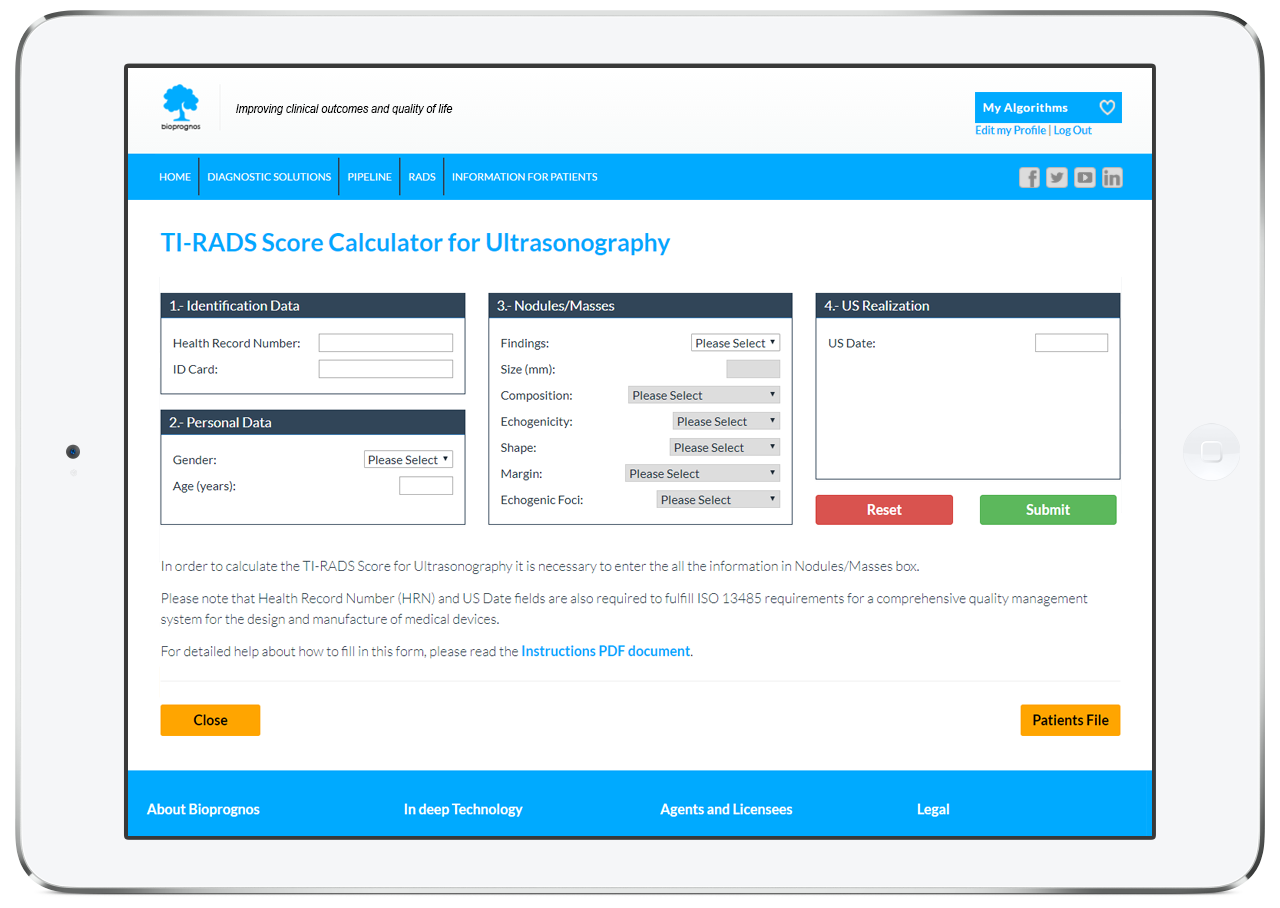
TIRADS for Ultrasound Bioprognos
shape: wider than taller (0 points) margin: extra-thyroidal extension (3 points) echogenic foci: macrocalcifications and peripheral / rim calcifications (3 points) The total number of points is 8, it is a TI-RADS category level 5, and the percentage of risk of malignant cell formation is 35%. Our calculator can help you with this calculation.

(PDF) Online TIRADS Calculator Tasha Ellchuk Academia.edu
AI TI-RADS Calculator. Interactive calculator for Artificial Intelligence (AI) Thyroid Imaging Reporting and Data System (TI-RADS) Features. Composition Cystic or almost completely cystic * 0 Spongiform * 0 Mixed cystic/solid 0 Solid or almost completely solid.

Reading Room Documents The Medford Radiological Group
Note to first time users: this calculator aids in the use of the reporting system endorsed by the Korean Society of Thyroid Radiology (KSThR) and Korean Thyroid Association (KTA) for the ultrasound assessment of thyroid nodules.Other, to a varying degree different reporting systems such as the EU-TIRADS and ACR-TI-RADS have also been published. Please consult institutional and national.
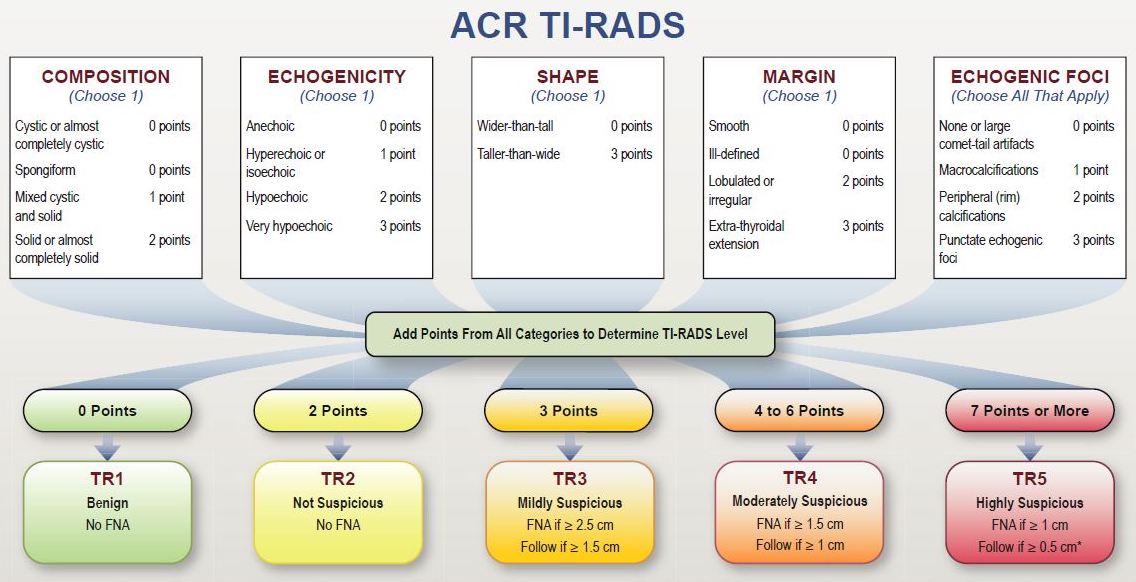
optimization of a risk stratification system for thyroid nodules Mateusz Buda
DNB/MD Radiology Practical Exam. NEET PG Radiology Seat. ACR TIRADS CALCULATOR FOR THYROID NODULES. TIRADS Sonographers Worksheet free download. Check out other radiology calculators: Accurately calculate thyroid nodules' TI-RADS score using the ACR 2017 White paper. Stratify patients based on the risk of malignancy with this thyroid calculator.
ACR Thyroid Imaging Reporting and Data System ACR TIRADS
ACR-TI-RADS™ calculator for thyroid ultrasound. Note to first time users: this calculator aids in the use of the reporting system designed by the American College of Radiology for the ultrasound assessment of thyroid nodules. Other, to a varying degree different reporting systems such as the EU-TIRADS and K-TIRADS have also been published.

TIRADS Thyroid Imaging Reporting and Data System Webinar Part III YouTube
The Thyroid Imaging Reporting and Data System (TI-RADS) of the American College of Radiology (ACR) was designed in 2017 with the intent to decrease biopsies of benign nodules and improve overall diagnostic accuracy. TI-RADS categories. Composition. Cyst. Spongiform.
TIRADS Calculator for Thyroid Imaging Example
ACR TI-RADS calculator. Nodule 1 Nodule 2 Nodule 3 Nodule 4. Location of nodule right left isthmus upper mid lower lateral medial anterior posterior; Size of nodule (fill at least one). Reporting and DataSystem (TIRADS): White Paper of the ACR TI-RADS Committee. J Am Coll Radiol. 2017 May; 14(5): 587-595. Close. Close. Close. Close. Close.

Using Artificial Intelligence to Revise ACR TIRADS Risk Stratification of Thyroid Nodules
TI-RADS Calculator. Online calculator for Thyroid Imaging Reporting and Data System (TI-RADS) based on 2017 ACR white paper with guidance on fine needle aspiration (FNA) and follow-up. Click here for images and description for each of the ultrasound features. Composition (Choose 1) *. Cystic or almost completely cystic 0 points.
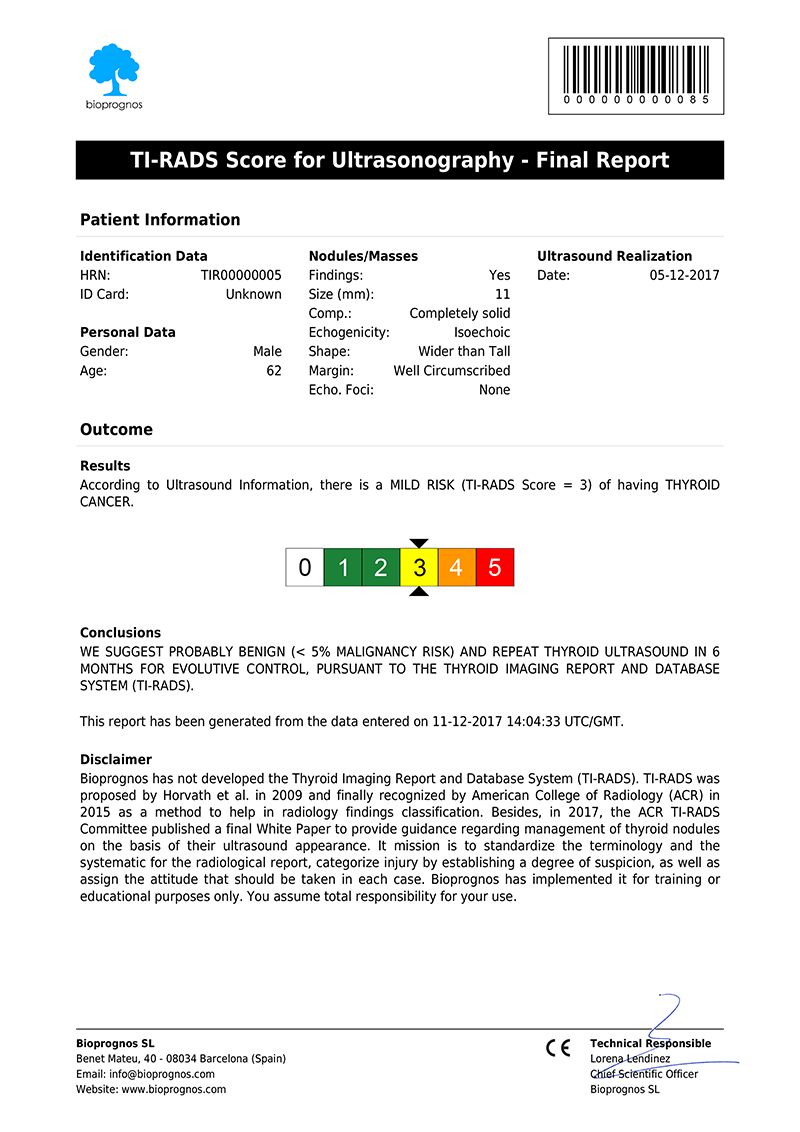
TIRADS for Ultrasound Bioprognos
In 2012, the ACR convened committees to (1) provide recommendations for reporting incidental thyroid nodules, (2) develop a set of standard terms (lexicon) for ultrasound reporting, and (3) propose a TI-RADS on the basis of the lexicon. The committees published the results of the first two efforts in 2015.
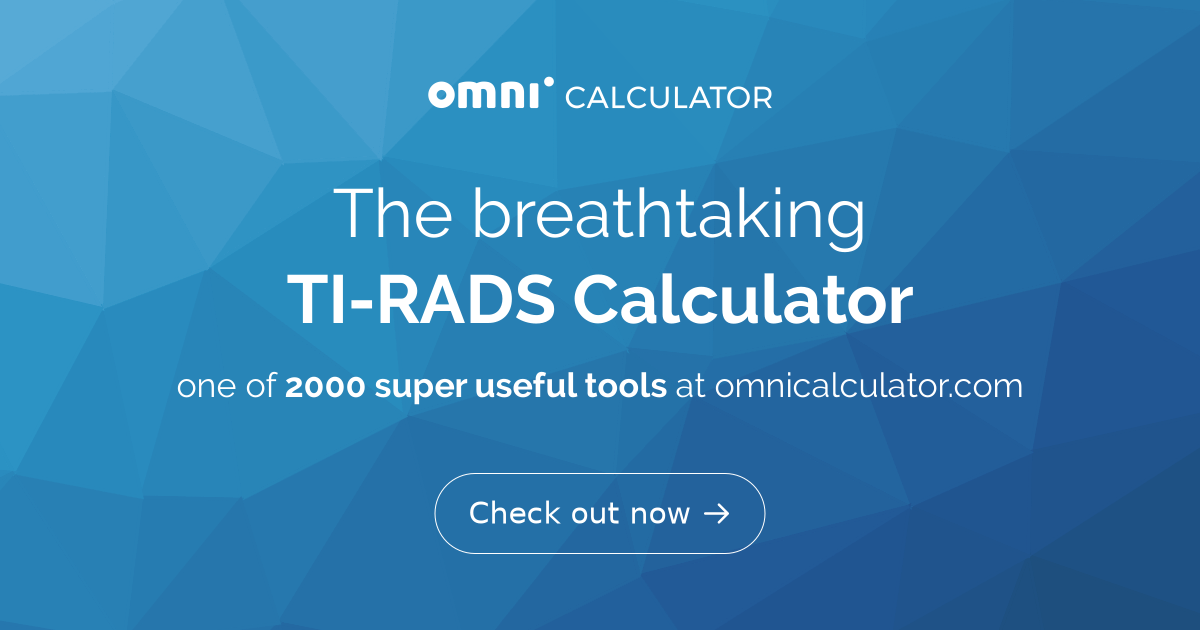
TIRADS Calculator For Thyroid Imaging
ACR TI-RADS is a reporting system for thyroid nodules on ultrasound proposed by the American College of Radiology (ACR) 1. This uses a standardized scoring system for reports providing users with recommendations for when to use fine needle aspiration (FNA) or ultrasound follow-up of suspicious nodules, and when to safely leave alone nodules.

(PDF) Online TIRADS Calculator
The TIRADS calculator helps you compute the American College of Radiology's (ACR) TI-RADS score, which is used in conjunction with an ultrasound device to assess thyroid nodules.. Read the article below to find out what the TI-RADS chart is and discover the ACR TI-RADS criteria and recommendations.We'll also talk about the types of lesion that can be found during thyroid screening and.
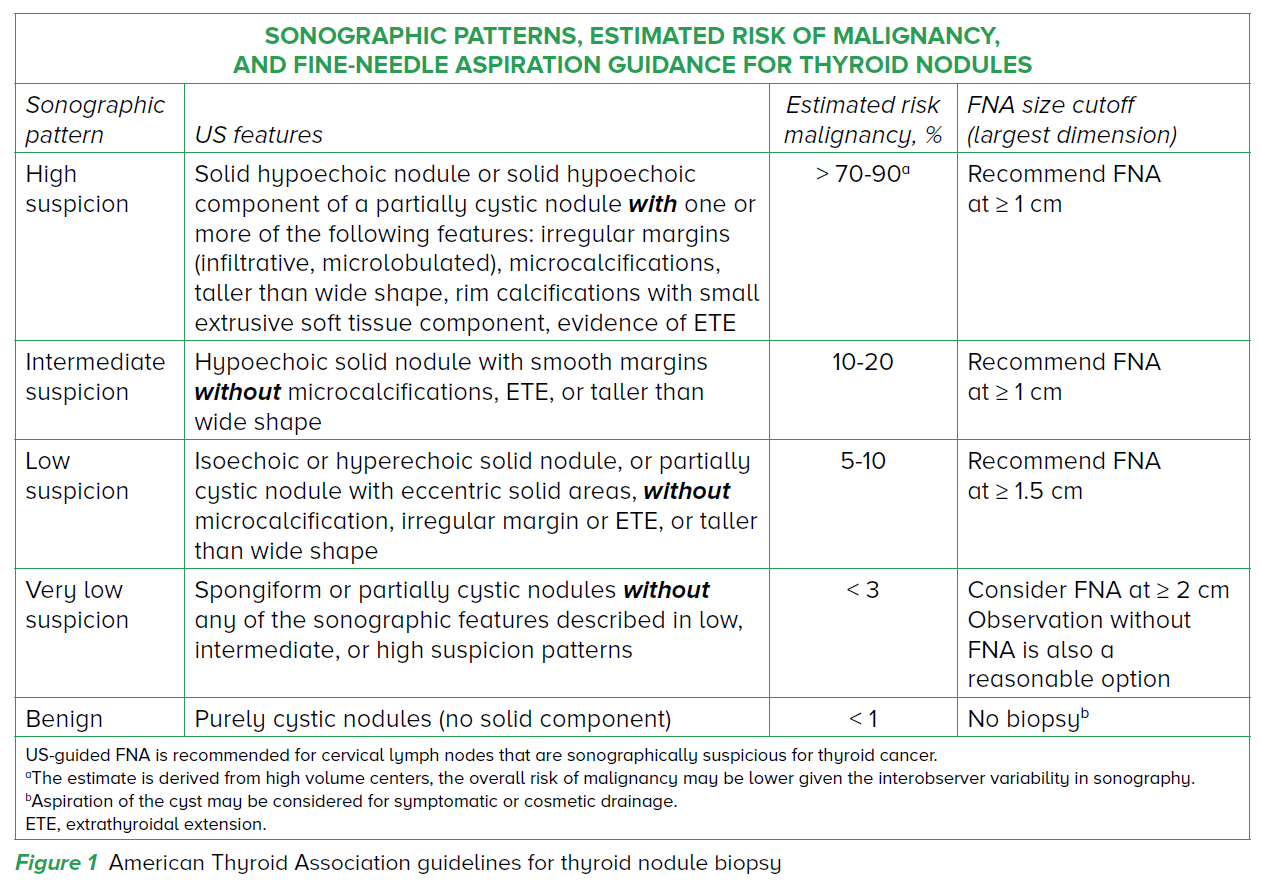
How to Manage Thyroid Nodules in Primary Care SingHealth
Note to first time users: Please note that this calculator aids in the use of the reporting system designed by the European Thyroid Association for the ultrasound assessment of thyroid nodules.Other, to a varying degree different reporting systems such as the ACR-TI-RADS™ and K-TIRADS have also been published. Please consult institutional and national guidelines to decide which system should.

TIROFigure2ACRTIRADSClassificationofThyroidNodulesmarked TIRO
TI-RADS Explained. The ACR TI-RADS (Thyroid Imaging Reporting and Data System) is a 5-point scoring system for thyroid nodules, based on ultrasound findings, developed by the American College of Radiology and published in 2017.It facilitates diagnosis of thyroid nodule and discrimination between benign or malignant so benefits identifying clinically important cancers whilst balancing the risk.

Thyroid normal ULTRASOUNDPAEDIA
UpToDate, electronic clinical resource tool for physicians and patients that provides information on Adult Primary Care and Internal Medicine, Allergy and Immunology, Cardiovascular Medicine, Emergency Medicine, Endocrinology and Diabetes, Family Medicine, Gastroenterology and Hepatology, Hematology, Infectious Diseases, Nephrology and Hypertension, Neurology, Obstetrics, Gynecology, and Women.

Image
Develop a standardized TI-RADS risk-stratification system based on the lexicon to inform practitioners about which nodules warrant biopsy. License Information Thyroid Imaging Reporting and Data System (TI-RADS) by American College of Radiology is licensed under a Creative Commons Attribution-NonCommercial-NoDerivatives 4.0 International License.
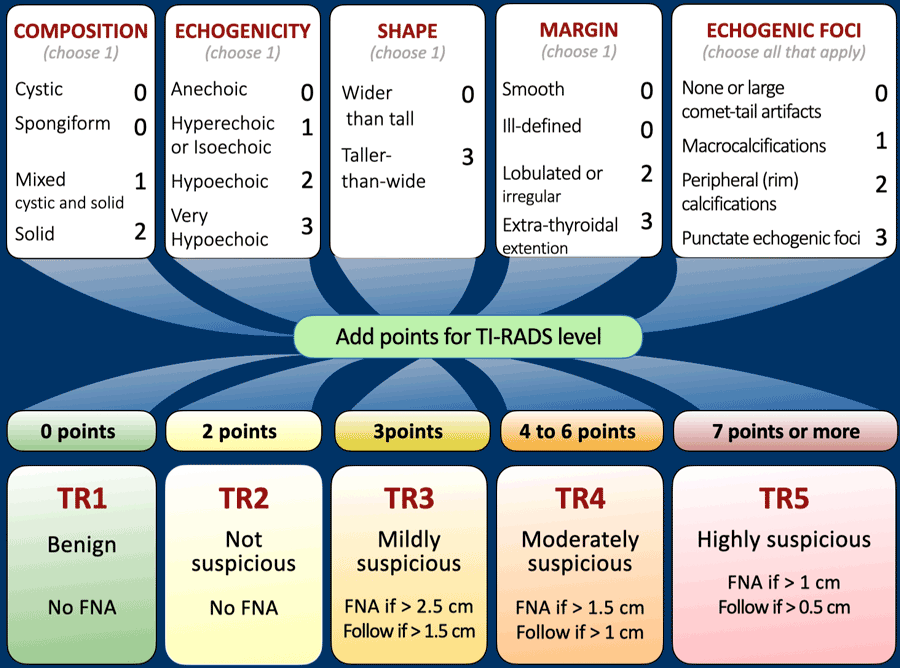
The Radiology Assistant TIRADS Thyroid Imaging Reporting and Data System
TI-RADS™. ACR's Thyroid Imaging Reporting & Data System. Chance of malignancy per TI-RADS: TR-1: Benign (<2% chance of malignancy) TR-2: Not suspicious (<2% chance of malignancy) TR-3: Mildly suspicious (<5% chance of malignancy) TR-4: Moderately suspicious (5-20% chance of malignancy) TR-5: Highly suspicious (>20% chance of malignancy) All.